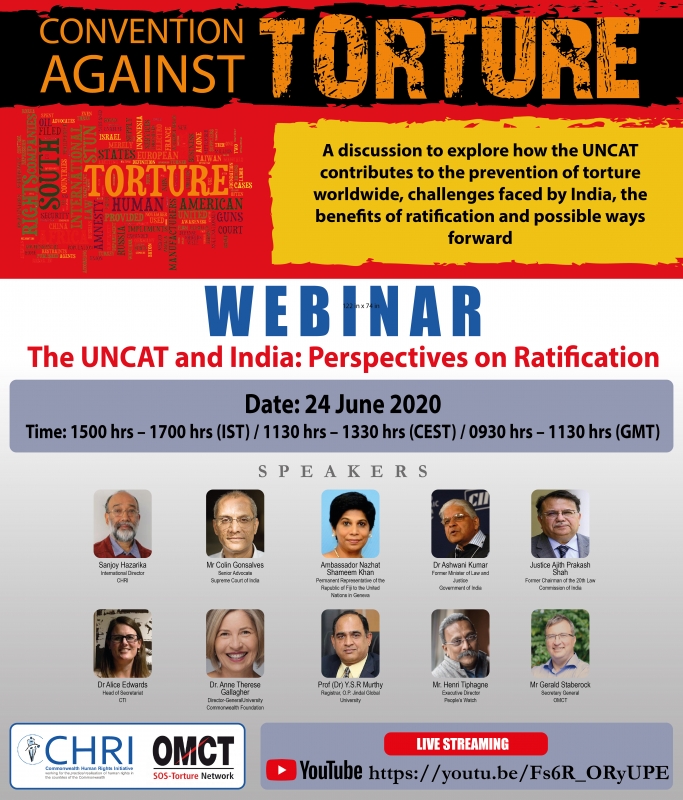Strong support for India to ratify the UN Convention against Torture
“As the international community prepares to commemorate the International Day in Support of Victims of Torture on 26 June, CTI participated in a webinar on “The UNCAT and India: Perspectives on Ratification”.
This webinar, organised by the Commonwealth Human Rights Initiative (CHRI) and the World Organisation Against Torture (OMCT) and held on 24 June 2020, gathered an impressive line-up of Indian and international speakers, with a strong call for India to ratify the UN Convention against Torture (UNCAT). Speakers included Dr. Ashwani Kumar, former Minister of Law and Justice and Senior Advocate at the Supreme Court of India, Justice Ajit Prakash Shah, former Chairman of the 20th Law Commission of India and former Chief Justice of the Delhi and Madras High Courts, and Ambassador Nazhat Shameen Khan, Permanent Representative of Fiji to the United Nations in Geneva. The event was moderated by Mr. Sanjoy Hazarika, International Director of CHRI. The agenda and full list of speakers can be consulted here.

India signed the UN Convention against Torture in October 1997 and has since regularly expressed its commitment to ratifying it, in particular during its Universal Periodic Review in May 2017 and in its voluntary pledges for the elections to the Human Rights Council in October 2018.
The panelists in this webinar exchanged views on opportunities for India to move ahead with the ratification of the Convention, as well as how to overcome obstacles standing in the way of this aspiration. Dr. Kumar stated that “Despite a stellar track record of human rights jurisprudence, we have not been able to give the people of India a law to preserve their dignity.” All speakers agreed that becoming a party to UNCAT and adopting strong anti-torture legislation will pave the way to an effective reduction in the risks and incentives leading to misconduct.
It was highlighted that given the practical nature of UNCAT, implementing its provisions helps countries bridge the gap between the existing legal prohibition of torture, recognised under both international and domestic law, and its application on the ground. It was noted that as a country committed to the rule of law, ratification of UNCAT by India would have a concrete impact on strengthening fair justice, professional law enforcement and the rule of law. Mr. Gerald Staberock, Secretary General of OMCT, stressed that:
“Ratifying UNCAT works. It works not only to prohibit torture but also to create effective processes to protect victims, engage in dialogue, empower civil society, unite State and non-State actors against torture and create fairer systems.”
As a CTI core State, Her Excellency Ambassador Nazhat Shameem Khan, Permanent Representative of Fiji to the United Nations in Geneva explained how her country had overcome initial obstacles and hesitations to UNCAT, becoming a party in 2016. She shared examples of the concrete benefits that UNCAT has brought to Fiji, in particular in the context of access to legal advice for persons in police custody and building trust between citizens and law enforcement agencies.
Dr. Alice Edwards, Head of the CTI Secretariat, shared a number of good reasons why 170 States have become parties to UNCAT, and noted that:
“UNCAT has helped countries abolish and rewrite old colonial laws that mandated hurt and suffering, for example in the treatment of prisoners; it has guided States to update laws and practices that no longer reflect modern law enforcement approaches, or which fail to match realities on the ground.”
In her conclusion she offered CTI’s “full support to the Government of India in its deliberations and action towards ratification of this fundamental human rights treaty”. Read Dr. Edwards’ full remarks here.
Background
CTI, launched in 2014, is an inter-governmental initiative, promoting the universal ratification and implementation of the UN Convention against Torture. The CTI is being spearheaded by the Governments of Chile, Denmark, Fiji, Ghana, Indonesia and Morocco, and is supported by a full-time Secretariat based in Geneva. CTI fosters constructive dialogue and international cooperation between States and offers technical and capacity building support to governments. The CTI Group of Friends is open to all UN Member States and serves as a platform for the exchange of knowledge, experience and ideas on how to overcome obstacles to ratification and implementation of the UNCAT.

